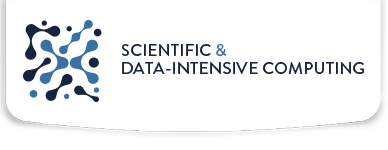The curriculum in Computational Modeling and Digital Twins trains graduates with strong skills in modern numerical simulation techniques that integrate data and machine learning approaches.
This curriculum comes with specific focusses, taking the form of predefined study plans, listed below:
- computational mechanics;
- computational modelling of ocean and climate;
- computational cosmology;
- computational physics and chemistry;
- computational modelling of discrete systems.
In case you wish to give the curriculum your own twist, you need to follow the general study plan of the curriculum, described below.
| Courses | ECTS | |
|---|---|---|
| I year (60 ECTS) | ||
| I semester | ||
| Probability and Statistics for Scientific Computing | 6 | |
| High Performance Computing (+) | 6 | |
| Cloud Computing (+) | 6 | |
| One course from Core Group A (+) | 6 | |
| One course from Core Group B | 6 | |
| One course from Core Group C | 6 | |
| #colspan# | ||
| II semester | ||
| Deep Learning | 6 | |
| One course from Core Group D | 6 | |
| One course from Core Group E | 6 | |
| One course from Complementary Group A | 6 | |
| #colspan# | ||
| II year (60 ECTS) | ||
| One course from Core Group F | 6 | |
| One course from Complementary Group A-B | 6 | |
| Elective courses | 12 | |
| Internship | 12 | |
| Thesis | 24 | |
(+): Integrated courses (modules combined in a single course)
| Core Group A Courses | ECTS |
|---|---|
| Advanced programming (*) | 6 |
| Software Development Methods | 6 |
| Core Group B Courses | ECTS |
|---|---|
| Numerical Analysis (*) | 6 |
| Stochastic Modelling and Simulation | 6 |
| Global and Multi-Objective Optimization | 6 |
| Core Group C Courses | ECTS |
|---|---|
| Introduction to Machine Learning (*) | 6 |
| Probabilistic Machine Learning | 6 |
| Reinforcement Learning | 6 |
| Core Group D Courses | ECTS |
|---|---|
| Advanced Numerical Analysis | 6 |
| Stochastic Modelling and Simulation | 6 |
| Core Group E Courses | ECTS |
|---|---|
| Algorithms for Scientific Computing (*) | 6 |
| Advanced Algorithms for Scientific Computing | 6 |
| Core Group F Courses | ECTS |
|---|---|
| Advanced Topics in Scientific Computing | 6 |
| Simulation Intelligence and Learning in Autonomous Systems | 6 |
(*) These courses contain introductory material and they cannot be inserted in the study plan if a course with a corresponding content has been attended during the bachelor or in other educational programs. Please ask the program coordinator if you are unsure.
You can add complementary courses from the following groups:
| Complementary Group A Courses | ECTS |
|---|---|
| Modelling and Control of Cyber-Physical Systems I | 6 |
| Probabilistic Machine Learning | 6 |
| Reinforcement Learning | 6 |
| Mathematical Optimization | 6 |
| Computational Fluid Dynamics | 6 |
| Remote Sensing | 6 |
| Introduction to Astrophysics and Cosmology | 6 |
| Computational Physics Laboratory | 6 |
| Computational Quantum Chemistry | 6 |
| Complementary Group B Courses | ECTS |
|---|---|
| Physics and modelling of turbulence | 6 |
| Marine Ecosystems Modelling and Analytics | 6 |
| Galaxy Astrophysics | 6 |
| Advanced Cosmology | 6 |
| Statistical Thermodynamics | 6 |
| Image Processing in Physics | 6 |
| Computational Solid Mechanics | 6 |
| Computer Vision and Pattern Recognition | 6 |
You have to add in the study plan elective courses from the following group:
| Elective Courses | ECTS | |
|---|---|---|
| All the courses in the previous tables | ||
| Computational Climatology | 6 | |
| Quantitative Ecology | 6 | |
| Information Retrieval and Data Visualisation | 6 | |
| Advanced High Performance Computing | 6 | |
| High Performance Computing and Data Infrastructures | 6 | |
| Advanced Deep Learning and Kernel Methods | 6 | |
| Data Management | 6 | |
| Bayesian Statistics | 6 | |
| Unsupervised Machine Learning | 6 | |
| GPU and Parallel Programming | 6 | |
| Machine Learning Operations | 6 | |
| Software Development Methods | 6 | |
| Modelling and Control of Cyber-Physical Systems II | 6 | |
| Artificial Intelligence for Cyber-Physical Systems | 6 | |
| Numerical Methods in Quantum Mechanics | 6 | |
| Radiative Processes | 6 | |
| Environmental Fluid Mechanics | 9 | |
| Molecular Simulation | 6 | |
| Computational Methods in Particle Physics | 3 | |
| Other courses (****) | ||
(****) Other courses can belong to any field of studies and any program of the university, provided they are coherent with the training path of the student.
